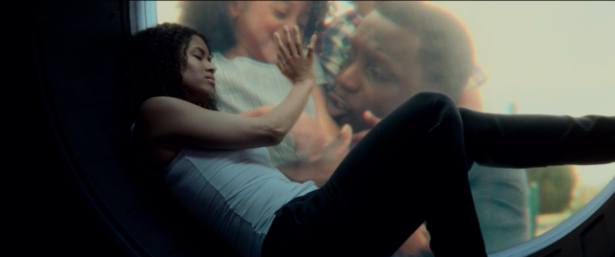
The Cloverfield Paradox centers around Ava Hamilton (Gugu Mbatha-Raw) who, in the year 2028, agrees to join seven other scientists, engineers, and doctors lead by Commander Kiel (David Oyelowo) on a mission aboard an International Space Station to use a particle accelerator to try to solve the world’s ongoing energy crisis. After their experimentation goes awry, the crew must figure out what has happened, where they are, the origins of the mysterious Mina Jensen (Elizabeth Debicki) who has suddenly appeared aboard and claims to be a crew member, and how to get back home to Earth after answering all of these questions.
While the paradox referred to in the film’s title is the discovery and melding of different dimensions and realities, the paradox presented in the film’s sub-textual theme is that of selfishness vs. self sacrifice. Hamilton and Kiel display the theory of sacrificing one’s happiness or one’s self for the greater good, while Jensen is an exploration of what it means to sacrifice others in service of something bigger. Kiel sacrifices himself so that the larger ship may arrive back to Earth while Hamilton sacrifices her chance to right her life’s greatest mistake, the death of her children, in order to save her entire planet. The choice is a great struggle for Hamilton, whose first instinct was to stay behind and have her second chance at keeping her family intact. But, she chose to sacrifice her small circle in order to save the larger group of humans on Earth.
Jensen too made this sacrifice, however, she offers up not a smaller group of people that she belongs too, but the smaller group of the surviving inhabitants of the space station to which she does not belong. For her, the question of killing 3 to save 8 billion is an easy one. The question of the collateral damage was an interesting one to ponder. Was Jensen incorrect? As previously mentioned, Hamilton made a similar choice, only one involving a small group that she belonged to and cared for rather than a group of people she had no connection to. Does the fact that Hamilton belonged to the group she chose to sacrifice make her decision more just than Jensen’s? If so, why? The moral question raised by the film added some intrigue to the viewing.
Despite this, the hype surrounding Cloverfield Paradox’s surprise release the night of Super Bowl LII after Netflix’s purchase of its rights from Paramount Pictures is not matched by the quality of the film. As the distribution of cinema continues to evolve toward an uncertain future, the quality of what is distributed is still paramount (no pun intended). The smoke and mirrors of new ground being broken is no substitute for good movies. The film’s premise is decent but not engrossing and the only character you really feel anything for is the lead, despite the large ensemble that we spend so much time with. The cinematography is pretty good during the space scenes, but at times it didn’t feel cinematic and more like a television show. Some have attributed this to the Netflix distribution of the film, but this isn’t true from my vantage point as many of their previous original films haven’t triggered the same reaction within me.
All in all, The Cloverfield Paradox does have an interesting thematic subtext but it isn’t strong enough to save the weakness of the rest of the film. Nothing within it is really striking or stands out, it’s a ho hum entry into a genre that barely adds anything we haven’t seen before and done better.
Image: Netflix

